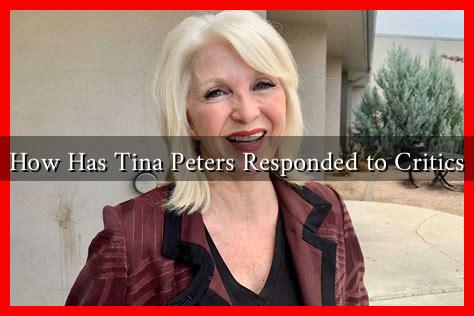-
Table of Contents
How Has Tina Peters Responded to Critics?
Tina Peters, the former Mesa County Clerk and Recorder in Colorado, has become a polarizing figure in American politics, particularly in the realm of election integrity. Her actions and statements regarding the 2020 presidential election have drawn both fervent support and intense criticism. This article explores how Peters has responded to her critics, examining her strategies, rhetoric, and the broader implications of her actions.
The Context of Criticism
To understand Peters’ responses, it is essential to grasp the context in which she operates. Following the 2020 election, Peters became a prominent advocate for claims of election fraud, particularly in relation to the voting machines used in her county. Her controversial actions included allegedly allowing unauthorized access to voting equipment, which led to legal challenges and investigations.
Defensive Rhetoric: A Common Strategy
Peters has employed a defensive rhetoric in her responses to critics, often framing herself as a victim of political persecution.
. This strategy resonates with her supporters, who view her as a whistleblower standing up against a corrupt system. Key elements of her defensive rhetoric include:
- Victimization Narrative: Peters frequently claims that she is being targeted for exposing the truth about election integrity.
- Allegations of Bias: She often accuses the media and political opponents of bias, suggesting that they are part of a larger conspiracy to silence her.
- Appeal to Patriotism: Peters frames her actions as a patriotic duty, urging her supporters to view her fight as one for democracy itself.
Engagement with Supporters
Another significant aspect of Peters’ response to criticism is her active engagement with her supporters. She has utilized social media platforms and public appearances to rally her base, often sharing personal anecdotes and testimonials from constituents who support her stance on election integrity. This engagement includes:
- Social Media Campaigns: Peters uses platforms like Twitter and Facebook to communicate directly with her followers, bypassing traditional media channels.
- Public Speaking Events: She frequently speaks at rallies and events, where she emphasizes her commitment to transparency and accountability.
- Fundraising Efforts: Peters has launched fundraising campaigns to support her legal battles, framing them as necessary for the fight against election fraud.
Legal Challenges and Counterattacks
Peters has also responded to critics through legal channels. Facing multiple lawsuits and investigations, she has countered these challenges by filing her own lawsuits and seeking to discredit the motives of her opponents. This legal strategy includes:
- Counter-Lawsuits: Peters has initiated legal actions against those she claims are defaming her character or undermining her efforts.
- Public Statements: She often issues press releases or statements that frame her legal challenges as politically motivated attacks.
- Legal Defense Fund: Peters has established a fund to support her legal battles, appealing to her supporters for financial assistance.
Impact on Public Discourse
The responses of Tina Peters to her critics have broader implications for public discourse around election integrity. Her approach has contributed to a growing divide in American politics, where narratives of fraud and corruption are increasingly prevalent. This polarization can be seen in various ways:
- Increased Mistrust: Peters’ claims have fueled mistrust in electoral processes among her supporters, leading to calls for more stringent election audits.
- Mobilization of Grassroots Movements: Her actions have inspired grassroots movements advocating for election reform, often aligned with her views.
- Media Scrutiny: The media’s coverage of Peters has intensified, with both supportive and critical narratives shaping public perception.
Conclusion
Tina Peters’ responses to her critics illustrate a complex interplay of defensive rhetoric, grassroots engagement, and legal maneuvering. By framing herself as a victim of political persecution and actively rallying her supporters, she has managed to maintain a significant following despite widespread criticism. The implications of her actions extend beyond her personal narrative, contributing to a larger conversation about election integrity and public trust in democratic processes. As the political landscape continues to evolve, Peters’ story serves as a case study in the dynamics of modern political discourse.
For further reading on the implications of election integrity claims, you can visit Brennan Center for Justice.



